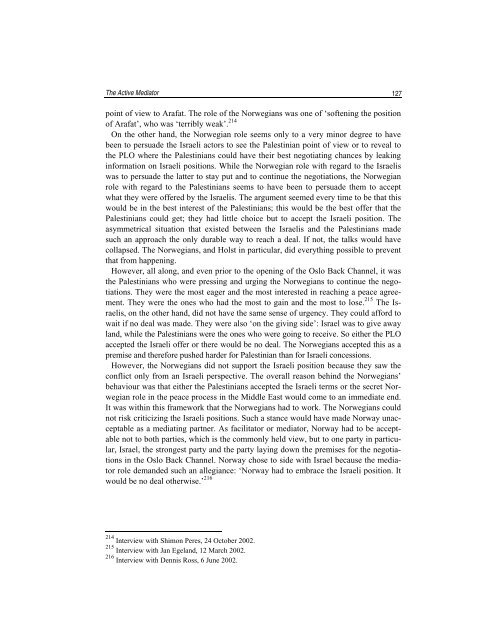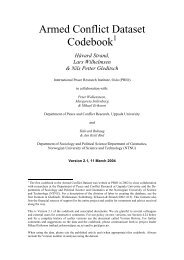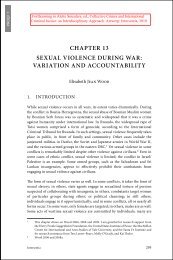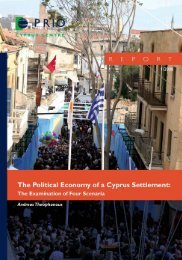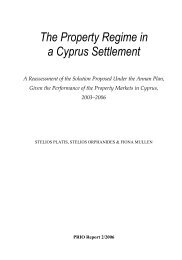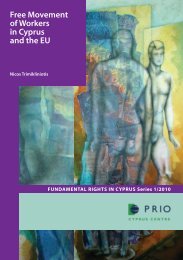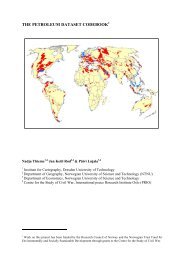Peacemaking Is a Risky Business - PRIO
Peacemaking Is a Risky Business - PRIO
Peacemaking Is a Risky Business - PRIO
Create successful ePaper yourself
Turn your PDF publications into a flip-book with our unique Google optimized e-Paper software.
The Active Mediator127point of view to Arafat. The role of the Norwegians was one of ‘softening the positionof Arafat’, who was ‘terribly weak’. 214On the other hand, the Norwegian role seems only to a very minor degree to havebeen to persuade the <strong>Is</strong>raeli actors to see the Palestinian point of view or to reveal tothe PLO where the Palestinians could have their best negotiating chances by leakinginformation on <strong>Is</strong>raeli positions. While the Norwegian role with regard to the <strong>Is</strong>raeliswas to persuade the latter to stay put and to continue the negotiations, the Norwegianrole with regard to the Palestinians seems to have been to persuade them to acceptwhat they were offered by the <strong>Is</strong>raelis. The argument seemed every time to be that thiswould be in the best interest of the Palestinians; this would be the best offer that thePalestinians could get; they had little choice but to accept the <strong>Is</strong>raeli position. Theasymmetrical situation that existed between the <strong>Is</strong>raelis and the Palestinians madesuch an approach the only durable way to reach a deal. If not, the talks would havecollapsed. The Norwegians, and Holst in particular, did everything possible to preventthat from happening.However, all along, and even prior to the opening of the Oslo Back Channel, it wasthe Palestinians who were pressing and urging the Norwegians to continue the negotiations.They were the most eager and the most interested in reaching a peace agreement.They were the ones who had the most to gain and the most to lose. 215 The <strong>Is</strong>raelis,on the other hand, did not have the same sense of urgency. They could afford towait if no deal was made. They were also ‘on the giving side’: <strong>Is</strong>rael was to give awayland, while the Palestinians were the ones who were going to receive. So either the PLOaccepted the <strong>Is</strong>raeli offer or there would be no deal. The Norwegians accepted this as apremise and therefore pushed harder for Palestinian than for <strong>Is</strong>raeli concessions.However, the Norwegians did not support the <strong>Is</strong>raeli position because they saw theconflict only from an <strong>Is</strong>raeli perspective. The overall reason behind the Norwegians’behaviour was that either the Palestinians accepted the <strong>Is</strong>raeli terms or the secret Norwegianrole in the peace process in the Middle East would come to an immediate end.It was within this framework that the Norwegians had to work. The Norwegians couldnot risk criticizing the <strong>Is</strong>raeli positions. Such a stance would have made Norway unacceptableas a mediating partner. As facilitator or mediator, Norway had to be acceptablenot to both parties, which is the commonly held view, but to one party in particular,<strong>Is</strong>rael, the strongest party and the party laying down the premises for the negotiationsin the Oslo Back Channel. Norway chose to side with <strong>Is</strong>rael because the mediatorrole demanded such an allegiance: ‘Norway had to embrace the <strong>Is</strong>raeli position. Itwould be no deal otherwise.’ 216214 Interview with Shimon Peres, 24 October 2002.215 Interview with Jan Egeland, 12 March 2002.216 Interview with Dennis Ross, 6 June 2002.


